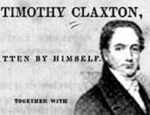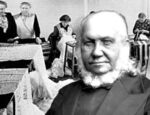Description
 Meet Arthur Pendennis, whose teacher, the terrifying ‘Doctor’, predicts for him a fatal fall down the social ladder because he mistranslates a word in ancient Greek. Arthur, known as ‘Pen’, is the hero of William Makepeace Thackeray’s 1849 novel The History of Pendennis.
Meet Arthur Pendennis, whose teacher, the terrifying ‘Doctor’, predicts for him a fatal fall down the social ladder because he mistranslates a word in ancient Greek. Arthur, known as ‘Pen’, is the hero of William Makepeace Thackeray’s 1849 novel The History of Pendennis.
Class anxiety pervades the novel, since Pen’s father John, a provincial apothecary, had only managed to sell his shop and buy landed property, thus fulfilling his dream of becoming a gentleman, by a combination of industry and luck. He sends Pen to Greyfriars, a Cistercian school which can prepare him for entry to Oxbridge, but Arthur was averse to all skills taught at school—to playground fighting ‘indeed to physic, the Greek Grammar, or any other exertion, and would engage in none of them, except at the last extremity.’
The crisis comes when the Doctor ‘put him on to construe in a Greek play. He did not know a word of it, though little Timmins, his form-fellow, was prompting him with all his might. Pen had made a sad blunder or two.’ At this point Thackeray gives the Doctor a memorable tirade in which knowledge of Greek is presented as equivalent to moral virtue, the defence of familial and national honour, and the sole guarantee of being able to avoid crime, destitution, and capital punishment:
‘”Pendennis, sir,” he said, “your idleness is incorrigible and your stupidity beyond example. You are a disgrace to your school, and to your family, and I have no doubt will prove so in after-life to your country. If that vice, sir, which is described to us as the root of all evil, be really what moralists have represented… for what a prodigious quantity of future crime and wickedness are you, unhappy boy, laying the seed! Miserable trifler! A boy who construes δὲ and, instead of δὲ but, at sixteen years of age is guilty not merely of folly, and ignorance, and dullness inconceivable, but of crime, of deadly crime, of filial ingratitude, which I tremble to contemplate. A boy, sir, who does not learn his Greek play cheats the parent who spends money for his education. A boy who cheats his parent is not very far from robbing or forging upon his neighbour. A man who forges on his neighbour pays the penalty of his crime at the gallows. And it is not such a one that I pity, (for he will be deservedly cut off;) but his maddened and heart-broken parents, who are driven to a premature grave by his crimes, or, if they live, drag on a wretched and dishonoured old age. Go on, sir, and I warn you that the very next mistake that you make shall subject you to the punishment of the rod.”’







